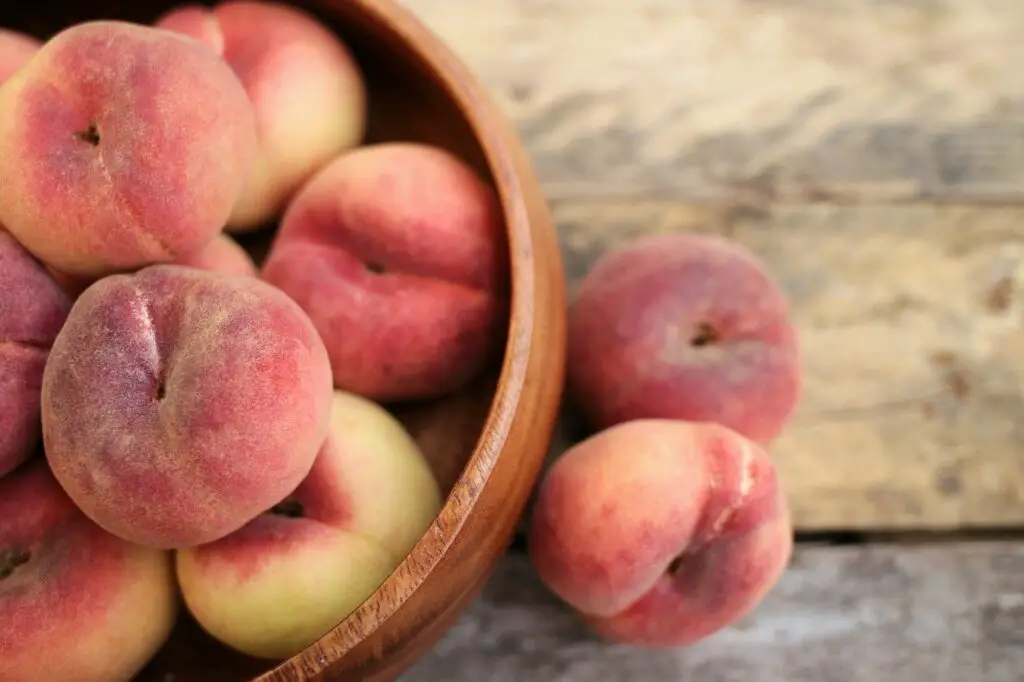It’s summertime; the whole family munch on juicy nectarines, enjoying their sweet sugary flavor.
Your dog is watching you with those big puppy eyes, wondering why they can’t have a turn.
You may be wondering if it’s safe to share nectarine with the pup.
After all, they are part of the family and shouldn’t miss out on the fun and flavor.
So, can dogs have nectarine?
Yes, but you must only offer your pup in moderation due to their high sugar content.
Nectarines are a healthy treat full of vitamins, minerals, and antioxidants.
However, too much sugar is not suitable for your dog’s health and can cause weight gain or other problems.
When feeding them nectarines, remove their pit and cut the fruit into small pieces to avoid choking hazards.
This article will discuss the benefits and risks of feeding your dog nectarines.
We’ll also give you tips on safely providing this fruit to your furry friend.

What nutrients will your dog get from nectarine?
When your furry friend takes some bites of this fruit, they will benefit from these nutrients:
- Vitamins A, B3, and C
- Fiber
- Minerals-copper and potassium
- Antioxidants-such as anthocyanins and flavonoids

How will your dog benefit from eating nectarine?
When your pup munches on some nectarines, it will enjoy these benefits:
A boost in their immune system
Vitamin C is known for its immune-boosting qualities.
It helps fight off infection and, due to its antioxidant properties, can help reduce inflammation.
Healthy skin and coat
Nectarines contain vitamins A and C, essential for maintaining healthy skin and fur.
These vitamins also help protect your pup from the sun’s harmful UV rays.
Copper in the fruit promotes collagen production, which helps keep your dog’s skin healthy and strong.
Better digestion
The fiber content in nectarines can help regulate your dog’s digestive system.
This can lead to fewer stomach issues such as constipation, diarrhea, and bloating.
Reduced risk of cancer
The antioxidants present in nectarines can help to protect your dog’s cells from damage.
This, in turn, may help to reduce the risk of developing cancer.
Weight management
If your dog is trying to lose a few pounds, nectarines can be a helpful addition to their diet.
This fruit is low in calories and fat but high in fiber.
Fiber helps your pup feel fuller for longer and can help regulate their weight.
Reduced oxidative stress
Free radicals in the body cause oxidative stress.
These can damage cells and lead to disease.
The antioxidants in nectarines help neutralize these free radicals and reduce oxidative stress.
Stable blood pressure
Potassium in nectarines helps to regulate blood pressure.
This mineral can also help to prevent heart disease and stroke.
Risks of feeding your dog nectarines
Although nectarines offer some great health benefits for your pup, some risks are associated with feeding them this fruit.
Potential risks include:
- Spiked sugar levels – Nectarines are high in sugar. If your dog eats too many nectarines, their blood sugar levels can spike. This can lead to weight gain, diabetes, and other health problems such as hypertension.
- Choking hazards – The pits of nectarines can pose a choking hazard for your dog. Cut the fruit into small pieces to avoid other choking hazards.
- Allergic reactions – Some dogs may be allergic to nectarines. Signs of an allergic reaction include itching, swelling, difficulty breathing, and gastrointestinal problems. Stop feeding your dog nectarines and contact your veterinarian if you notice these signs.
Tips for feeding your dog nectarines
Now that you know the benefits and risks of feeding your dog nectarines, here are some tips on how to do so safely:
- Choose organic whole fruits and wash thoroughly. This removes pesticides or chemicals that may be present on the fruit.
- The pit is a choking hazard and may also have cyanide, poisonous to dogs. Completely remove it.
- Cut the nectarine into small pieces that your pup will comfortably digest. Dogs can safely eat nectarine flesh and skin. You can also blend the nectarine to make juice, puree the fruit, or make a smoothie and add it to their meal.
- Monitor your dog for any signs of an allergic reaction. If you notice any symptoms, stop feeding them nectarines and contact your veterinarian.
- Do not feed your dog nectarines that have begun to go bad. Spoiled nectarines can contain mold or bacteria, harmful to your pup. Furthermore, the rot produces alcohol toxic to your dog.
If you want to feed your dog nectarine, but they dislike the offer, try mixing it with plain yogurt or cottage cheese.
This can help to make the nectarine more palatable for your pup.
You can also give your dog time and try serving them later.
Avoid feeding your dog canned or commercially made nectarine juice.
These products are high in sugar and additives that can harm your pup.
Prepare whole nectarine at home as you choose safe ingredients.
Do not add sugar or grape flavorings as these are toxic to the dog.
When in doubt, consult with your veterinarian.
Based on your dog’s individual health needs, they can offer more specific advice on safely feeding them nectarines.
Can I give my dogs alternative fruits, other than nectarines?
While nectarines offer some great benefits for your pup, you can provide other fruit types.
Alternative healthy options include:
- apples
- bananas
- blueberries
- watermelon
- Cantaloupe
- Pears
- Mangoes
Frequently asked questions (FAQs)
Can diabetic diabetes dogs have nectarine?
No, it’s not advisable to give nectarines to dogs with diabetes.
The high sugar content in nectarines can cause a spike in blood sugar levels, which can be dangerous for dogs with diabetes.
Can I give my dog fresh or frozen nectarine?
Yes, you can give your dog fresh or frozen nectarine.
Remove the pit and cut the fruit into small pieces to avoid choking hazards.
Can puppies have nectarine?
Yes, puppies can have nectarine as long as it’s safely prepared for them and cut into small pieces.
Give them tiny amounts to start with and see how they respond before offering more.
How many nectarines should I give my dog at one time?
That depends on the size of your dog.
A good rule of thumb is to start with a small piece of nectarine and see how your dog does.
If they seem to enjoy it and have no adverse reaction, you can offer more.
Give nectarine as a snack or a small part of a meal, and don’t let it constitute more than 10 percent of your dog’s food.
To conclude
Nectarines are a healthy and delicious treat for your dog.
However, feed your dog a small amount.
Too much fruit can lead to weight gain and other health problems.
Ensure to take precautions and monitor your pup for any allergic or adverse reaction signs.
If you have any concerns, contact your veterinarian.
- What Dog Breeds Have Pink Skin? - March 24, 2023
- What Are the Most Inspiring Dog Breeding Quotes? - March 20, 2023
- Can Pheromone Spray Help Improve Dog Breeding Results? - March 19, 2023








